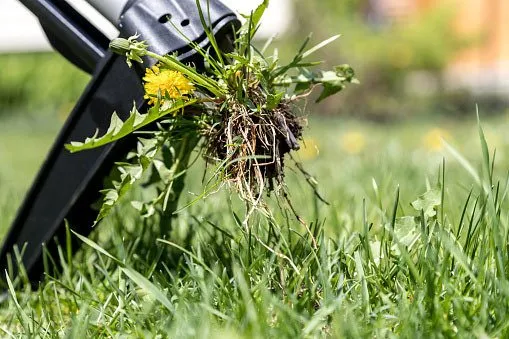Controlling weeds in your lawn involves a combination of preventive measures, manual removal, and, if necessary, the use of herbicides. Here are some steps you can take to get rid of weeds in your lawn:
1. Maintain a Healthy Lawn:
- Mow Regularly: Keep your grass at the recommended height for your specific grass type. Taller grass shades the soil, preventing weed growth.
- Watering: Water deeply and infrequently. This encourages deep root growth for your grass, making it more competitive with weeds.
2. Manual Removal:
- Hand Pulling: For a few weeds or isolated patches, manually pull them, ensuring you remove the entire root system.
- Use a Weeding Tool: Tools like dandelion diggers or weed pullers can help you remove weeds with minimal disturbance to the surrounding grass.
3. Lawn Care Practices:
- Aeration: Aerating your lawn improves soil structure and reduces thatch, making it easier for grass to grow and less favorable for weeds.
- Overseeding: Planting new grass seed can help fill in bare spots, making it more difficult for weeds to establish.
4. Mulching:
- Mulch Beds: Apply a thick layer of mulch in flower beds and around trees to prevent weed growth.
5. Herbicides:
- Selective Herbicides: These target specific types of weeds without harming your grass. Read and follow the instructions carefully.
- Pre-emergent Herbicides: These prevent weed seeds from germinating. Apply them before the weed seeds have a chance to sprout.
- Post-emergent Herbicides: These target existing weeds. Apply them according to the instructions, and avoid spraying on windy days to prevent drift.
6. Natural Remedies:
- Vinegar Solution: Mix vinegar with water and a small amount of dish soap. Spray on weeds, but be cautious as it can also affect your grass.
- Boiling Water: Pour boiling water on small weeds, being careful not to damage surrounding grass.
7. Regular Maintenance:
- Regular Inspections: Monitor your lawn regularly for signs of weeds and take action promptly.
- Fertilize Appropriately: Proper fertilization helps promote healthy grass, making it more resistant to weed invasion.
8. Professional Help:
- If your weed problem is extensive or persistent, consider consulting with a lawn care professional for advice or assistance.
Remember to identify the types of weeds you’re dealing with, as this can help you choose the most effective control methods. Always follow product instructions carefully when using herbicides to avoid harm to your lawn and the environment.

